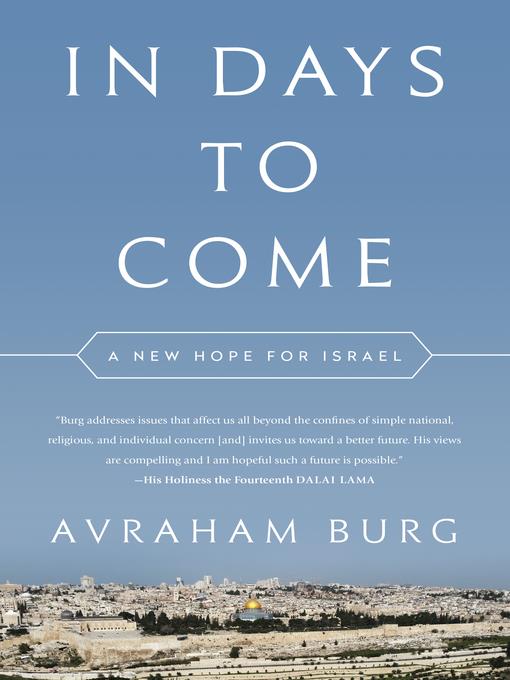
In Days to Come
A New Hope for Israel
- اطلاعات
- نقد و بررسی
- دیدگاه کاربران
نقد و بررسی

November 13, 2017
Former Knesset speaker Burg reflects on his life and pushes for a reconsideration of Israeli identity in this dense political memoir. In the first third, he summarizes his biography, which presupposes a fair level of familiarity with Israel’s political history. Burg, part of the first generation born after the foundation of the Israeli state, grew up with a European father and a mother from Hebron. He recounts feeling at odds with both the ultra-Orthodox and the secular settlers as a religious but not overly devout youth. His tales of public life often jumble timelines and have an unfocused reminiscent quality. After he explains his eventual drifting away from political life, he turns to unconnected essays in which he obliquely presents his views of a reimagined Jewish and Israeli identity. He makes provocative claims about the irony of clinging to the Holocaust to defend ousting Palestinians, the danger of religious extremism, and the importance of reinvigorating Israeli life by adopting a more hospitable European model of Jewishness. Burg’s work will struggle to find a wide audience, but those already invested in questions of Zionism and Israel’s turn toward religious fundamentalism will find plenty to consider.

November 1, 2017
A leftist Israeli activist delivers a singular sermon explaining what needs urgent repair in the Jewish democracy.Burg (The Holocaust Is Over; We Must Rise from Its Ashes, 2008, etc.), once the speaker of Israel's parliament, the Knesset, and a past leader of the World Zionist Federation and the Jewish Agency for Israel, has renounced politics. His father, a political leader of the founding generation, was a religious Zionist. The author took a more liberal course, discarding religious orthodoxy. He describes himself as a "Protestant Jew." Eventually, Burg became disillusioned with the Labor Party in whose government he served. He could not abide the perceived deceit, abuse, and lies that are endemic to governing. Israel started to go wrong, he asserts, with victory in the Six-Day War. He was 12 then and a student at a yeshiva. His revered father, in his government post, did not thwart settlements in Palestinian territory. Matters became worse after the Yom Kippur War, and then came the carnage, much of it sponsored by Ariel Sharon. It is clear to Burg that Israel lost its way; like him, he argues, the nation must become more cosmopolitan. He feels as at home in Vienna as he does in Jerusalem. To him, a "European Jew," fellow Jews are not just Israelis. Now in his 60s, Burg's youthful idealism remains unabated, and he urges separation of church and state. To solve the land's most pressing dilemma, he envisions two states in a sort of confederation, one that will be a source of amity and attract other nation-states. Integration, not separation! Thus, the author proposes difficult, even frighteningly dangerous courses of action, and he will surely be called a dreamer and a false prophet by many opponents. But what, he might reply, are the better paths?A heartfelt synthesis of a coming-of-age story, a political jeremiad, a memoir, and a manifesto.
COPYRIGHT(2017) Kirkus Reviews, ALL RIGHTS RESERVED.




دیدگاه کاربران